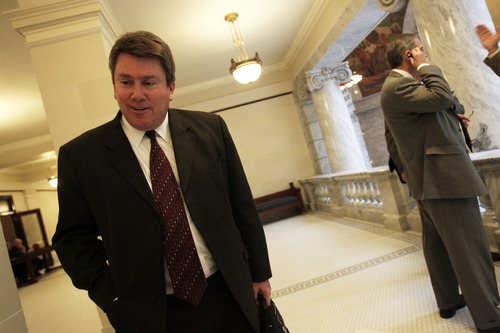This is an archived article that was published on sltrib.com in 2012, and information in the article may be outdated. It is provided only for personal research purposes and may not be reprinted.
UTOPIA isn't unique among broadband networks for its debt-burdened finances.
Both public and private fiber-optic networks commonly borrow heavily as they build infrastructure and develop a viable subscriber base, several industry observers said.
"When you build a network like this, it takes a minimum of several years of spending a lot of money before you start to get it back from your customers,'' said Christopher Mitchell, an expert in municipal broadband-network financing with the Institute for Local Self-Reliance, a Minneapolis-based nonprofit think tank for sustainable community development.
But by any definition, Mitchell said, "UTOPIA is at the far end. Its debt far exceeds what it should.'' And although he praised UTOPIA for what he said is world-quality broadband service at a competitive price, Mitchell said its model of "borrowing a lot of money to build an open-access network just does not work.''
An informal survey by the Utah Taxpayers Association, an avid UTOPIA critic, found the Utah network had the single highest bond indebtedness of about 40 municipal grids the group studied.
As many as 834 companies, government agencies and other providers offer some combination of broadband data, video, voice or other services to U.S. residential and business customers, according to an industry database kept by Broadband Communities, a New York-based industry publisher and consultant to broadband users.
UTOPIA and iProvo are among at least 114 municipal fiber-optic networks across the country, the industry survey shows.
At least 24 providers offer broadband access of some kind in Utah, most of them telecommunications firms, ranging from CenturyLink, formerly Qwest, to an assortment of local phone exchanges such as Beehive Telephone and Manti Telecommunications.
Phone companies are by far the largest segment of the fiber-to-customer market nationally with about 625 U.S. broadband networks, run by the national carriers left over from the early 1980s breakup of AT&T and by smaller companies created since then.
Intense competition between municipal networks and private companies plays out on many fronts; battles are especially fierce in public relations, lobbying government for regulatory advantages and municipal rights of way for cable conduits alongside roads and on telephone poles.
State law requires UTOPIA to operate as a wholesaler, a limitation conceived at UTOPIA's inception when telecommunications giants such as CenturyLink and Comcast, now called Xfinity, grew wary of plans by Spanish Fork and Provo to get into the cable television business and lobbied state lawmakers for protections.
"We shouldn't have to compete with the government,'' said Steve Proper, a lobbyist for Comcast in Utah and Arizona. Proper said the company sought to curtail how municipal networks operate "to maintain a level playing field.''
The result was the Municipal Cable Television and Public Telecommunications Services Act.
The law's main sponsor, former House Speaker Greg Curtis, R-Sandy, now says it was intended to apply only to cable TV services, not Internet access.
Spanish Fork launched its services before the bill passed and was exempted. But the wholesale rules require iProvo and UTOPIA to work through separate retailers to market and sell their bandwidth, as well as provide customer service and collect monthly bills.
At the time, UTOPIA did not object, claiming it was working under a new paradigm and wouldn't be hampered by the rules. A decade later, however, Curtis is now a UTOPIA lobbyist and claims the legislation is unfairly restrictive for a municipal utility.
``It ought to be revisited,'' he said, "and let the current officials decide.''
Tribune reporter Cimaron Neugebauer contributed to this story.





